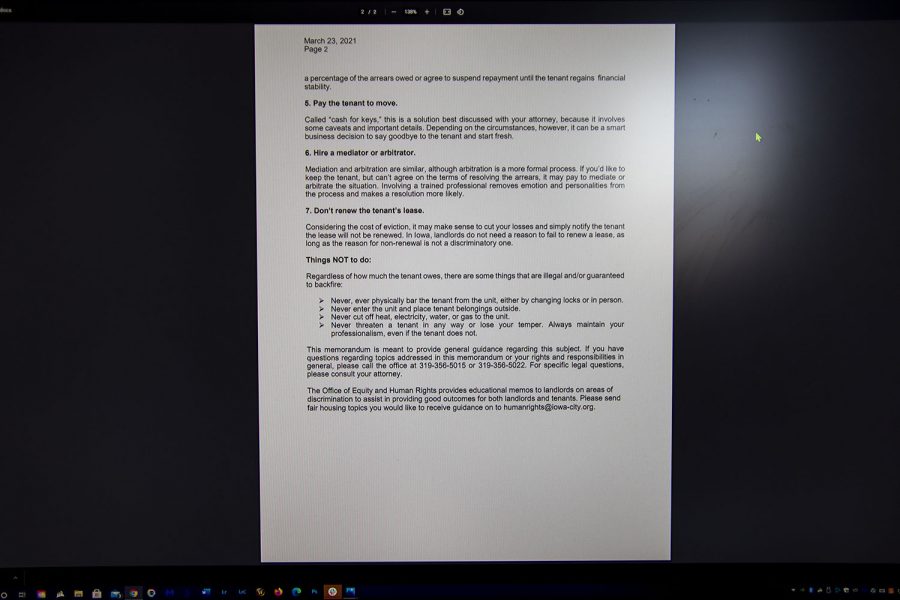Iowa City issues alternatives to eviction memo following extension of federal eviction moratorium
Iowa City’s Office of Equity and Human Rights released a memo acknowledging the CDC’s extension and providing local landlords and tenants with educational resources to prevent conflicts and evictions.
Photo of the City of Iowa City Memo.
April 1, 2021
Iowa City will provide guidance and educational resources for local landlords and tenants following the recent extension of the moratorium on evictions until at least June 30 from the Centers for Disease Control and Prevention.
This extension will ban landlords from evicting their tenants based on their inability to pay rent, but landlords will still be able to evict tenants for other appropriate reasons that violate lease agreements.
The moratorium will only apply to eviction itself, not the obligation to pay rent.
Iowa City Shelter House Director of Development Christine Ralston said it was clear the CDC’s moratorium was extended due to the ongoing pandemic and the issue of people losing housing.
“While the distribution of the vaccine is a very positive thing, it [COVID-19] is far from over,” Ralston said. “We’ve seen upticks across communities nationwide. So, we know the pandemic is not under control, which means that we have to keep people housed, and we always frankly have to keep people housed. But the fact that this was issued for the purposes of containing the pandemic, there’s no justifiable reason to end it now.”
In response to this, Iowa City’s Office of Equity and Human Rights released a memo on March 23, offering alternatives to eviction for local landlords and tenants.
City Human Rights Investigator Kristin Watson said this moratorium extension prompted the city to release this memo.
RELATED: State bill would remove Iowa City ordinance preventing income-based housing discrimination
“We haven’t seen an increase in evictions yet, but we anticipate that as soon as the moratorium runs out,” Watson said. “Then there’s going to be a national wave of evictions because all of these people – for instance, restaurant workers or retail workers, people whose businesses have been shuttered are not earning money – they are at risk for eviction at the point the moratorium is lifted.”
The recommendations within the city’s memo include talking with the tenant, offering an altered payment plan, arrange for an exchange of services, reduce or defer the arrears (status of payments), pay the tenant to move, hire a mediator or arbitrator, and not renew the tenant’s lease.
Watson said this issue brought by COVID-19 has harmed both landlords and tenants.
“It’s a very complicated issue because tenants are hurting and eviction can follow a person for years, but at the same time, not all landlords are large companies. Many landlords are just people with one or two rental properties, and they need to pay their bills, too,” Watson said. “So, you know, it’s a really bad situation for both tenants and landlords, and that was the purpose of the memo and to try to alleviate some of the pain on both sides.”
Executive Director of Johnson County Affordable Housing Coalition Sara Barron said there has been a decrease in evictions in the area for several reasons, particularly because of the federal eviction moratorium during COVID-19.
“There are local and state and federal resources to help people pay past-due rent if they’ve been impacted by COVID-19,” Barron said. “Also, we have seen some landlords who understand that the pandemic has made it very difficult for people who have lost wages or face other financial hardship. So, some landlords have been more flexible with renters who haven’t been able to make their full rent payments.”
Ralston said the combination of both the local relief and assistance programs, along with the extended moratorium, will benefit renters.
“The eviction moratorium does not include rent relief, so just because your landlord can’t evict you doesn’t mean that you don’t owe your landlord that money at the expense of the expiration of the moratorium,” Ralston said. “So that’s why the policy and the program work in concert, because the starting eviction moratorium keeps folks housed, and the eviction prevention fund, allows them to continue paying rent.”
She added that this will benefit individuals when the eviction moratorium expires, so that individuals aren’t several months in arrears and unable to pay, and then evicted and experiencing homelessness.
Evictions and conflicts between landlords and tenants have long been an issue that was only heightened by the pandemic, Barron said.
Barron said throughout the past year, the Johnson County Affordable Housing Coalition has increased their advocacy and education regarding resources for tenants struggling with rent and utilities. Going forward, the Johnson County Affordable Housing Coalition will continue some of the new partnerships they have formed, such as Shelter House and Iowa Legal Aid.
Barron acknowledged the various local, state, and federal assistance programs that have helped tenants with rent and utility during this time. However, she said ensuring a wide variety of affordable housing for everyone in the community is most efficient in reducing evictions.
“The very best way to prevent eviction is to have housing that is affordable for people with a variety of income,” Barron said. “In addition to those interventions when someone’s on the brink of eviction, we also have to continue our work to make sure that we have a supply of housing that is affordable and appropriate for people, and also that people have income that allows them to afford their basic needs. And so that work continues before, during, and after the pandemic as well.”






